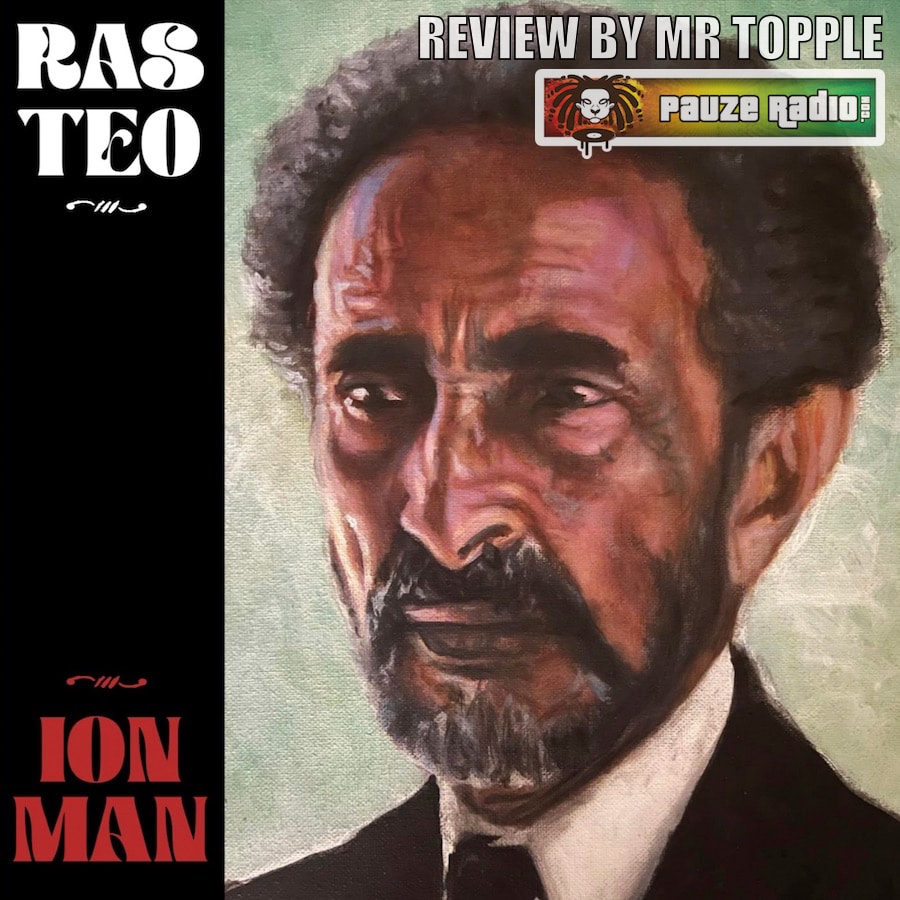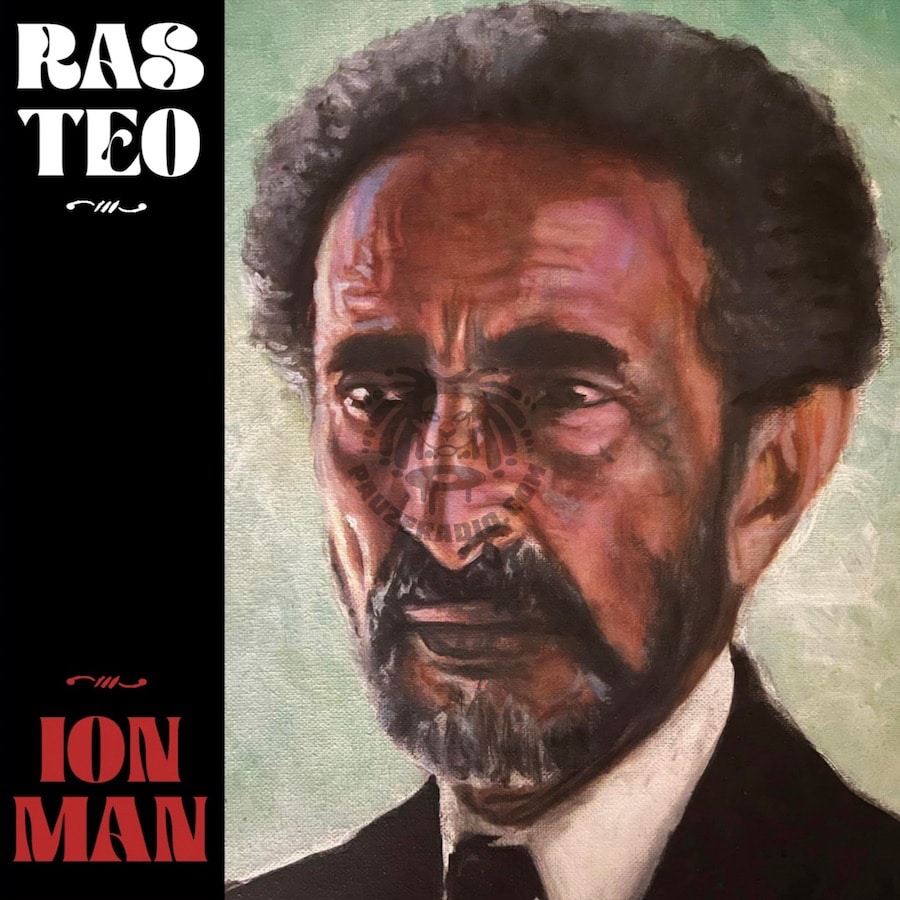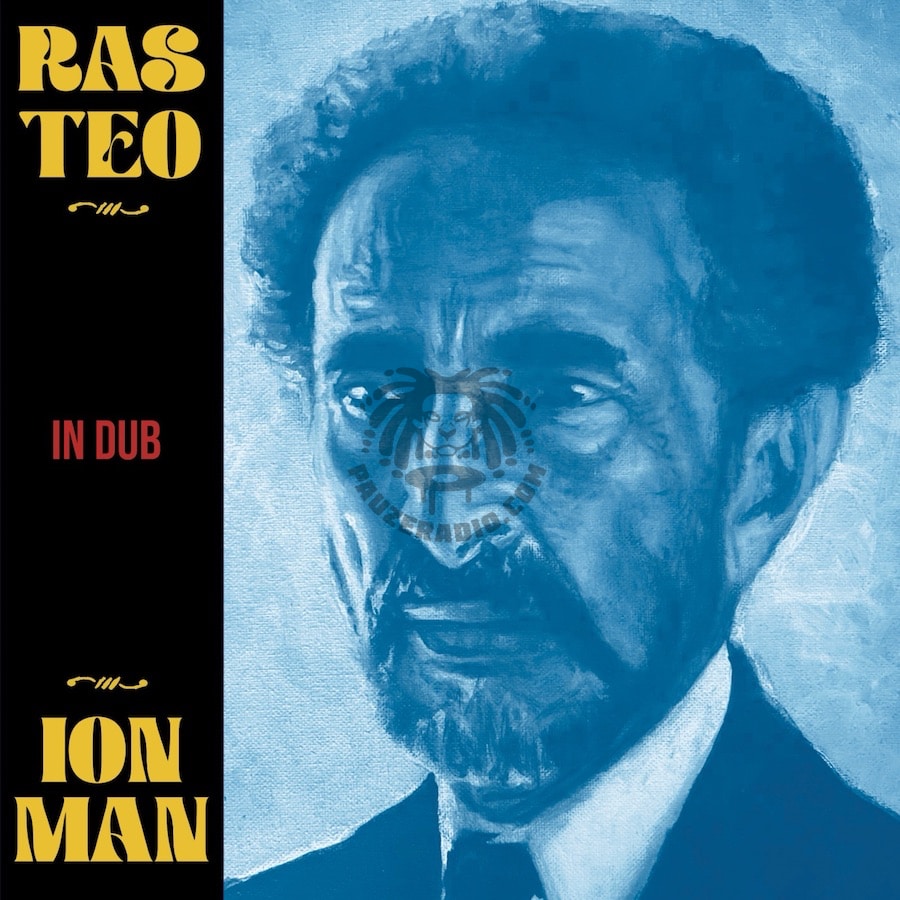
Ras Teo – Ion Man & Ion Man In Dub – Review
Ras Teo: Ion Man and Ion Man in Dub Album Review by Mr Topple for Pauzeradio.com.
Ras Teo is a force to be reckoned with – as are Zion I Kings (ZIK). So, when the two (plus other renowned names) come together the results should be remarkable. And they certainly are with this latest album.
Ion Man and Ion Man in Dub, released via Forward Bound Records and Zion I Kings, sees Teo join forces with members of ZIK, Lone Ark, and I Grade. Specifically on the latter, the final mastering from perhaps the most sought-after engineer in the business, Laurent “Tippy I” Alfred, is superb: giving that classic rich Roots sound while playing sympathetically to the more ingenious twists and turns of the productions.
The release features one record with the original versions, and then an entire other record of dubs. Here, Pauzeradio is reviewing them together – as surely you cannot have one without the other?
The title track opens proceedings. Set in an ambiguous minor key (ambiguous because the arrangement is such that it doesn’t feel too sombre), Ion Man treads a brisk pace. The stuttering rhythm section – which sees Roberto “Lone Ark” Sánchez deploy drums, keys, and rhythm guitar, while David “Jah David” Goldfine takes the bass – is central to the sound. Drums don’t perform a traditional one drop – instead the kick focuses on the downs, double-timing these at points, while the snare hits the two and four and hi-hats tinker in between. The bass does an intricate, syncopated drop-beat rhythm, which briefly misses the three on some phrases, and keys run a bubble rhythm which barely deviates from this. One rhythm guitar runs a sequence not dissimilar to the bass, while the other skanks – and all this makes for an unfussy but forward-moving and breathy arrangement.
On top of this, there’s a pleasing, expressive horn arrangement from Okiel Mcintyre’s trumpet and trombone – with the former doing a superb improv section towards the end of the track, on which the trombone also pops in briefly. Zoe Brown’s flute intersects well with this. There’s keen attention to detail on the engineering, too – with some nice use of reverb and decay. Teo’s vocals are controlled, detailed in terms of note clipping and extension and embouchure – while dynamically he never over-exerts himself, keeping his performance delicate but pointed. Lyrically, Ion Man delivers a nice play on words, as Teo laments the strength and purpose of Jah and those of faith in the face of Babylon’s mendacity – and overall, the whole thing is dynamic and pleasing.
The Dub version sees the engineering take centre stage. The arrangement is at time brilliantly stripped-back to almost nothing, except for the heavily messed with rhythm section. The use of reverb is very effective, creating intricate waves of sound, and there’s some great synths and samples that come to the fore here.
Next, and Long Iwa changes tack slightly, seeing the space-creating arrangement of Ion Man replaced by a smoother, more drawn out and detailed sound. This doesn’t come entirely from the rhythm section, however – as it maintains a similar pattern to the previous track, albeit with the bass hitting every beat, which aids the more fluid feel. Aside from that, keys run a bubble rhythm and the drums run a similar line, but with additional syncopation on the hi-hats. The use of washboard-style piece of percussion also brings added interest.
However, what sets Long Iwa apart from Ion Man in terms of flow is the additional instrumentation. Sánchez’s organ brings smoothness to proceedings – which is then complemented by the horn and flute arrangement. Here, while still being rhythmically intricate Mcintyre and Brown lose the staccato performance approach – instead, opting for more legato notes. This coupled with Teo’s smoother vocal (both rhythmically and in terms of note length) means the track overall feels more meandering – despite it being nearly an identical BPM. The addition of synth strings compounds this – and Teo’s lyrical narrative about the ‘long time’ (iwa) that Rastafari have been treading a righteous path – while Babylon’s deception remains the same – and yet still maintain faith, is pertinent and fits beautifully with the attractive musical backdrop.
The Dub version once again impresses – here, focusing on the additional instrumentation like the horns for the main thrust of the musicality, while dropping in important parts of Teo’s vocal. There are some deliciously stark breaks – and the whole thing is affecting.
Hard Fe Ketch changes the mood of Ion Man completely, albeit briefly – seeing it opening in a major key, before quickly switching back into a minor. There’s something of the Nyabinghi here, with the almost mesmerising drums coupled with the additional percussion of Goldfine’s kette and shaker pattering in the background, while Sánchez’s backing vocals bring in choral elements with their vowel-based harmonisation. Those Roots elements across the rest of the rhythm section are still present – notably the bass on a predominantly one-drop rhythm, here.
Once again, Mcintyre and Brown bring the goodness on the horns and flute respectively, in this instance offering expressive responses to Teo’s main calls on the chorus, while Brown specifically improvs on the verses. Both artists bring very good use of crescendo and decrescendo to make their lines particularly expressive. The inclusion of the organ, briefly but crucially, finishes this off perfectly. Teo’s vocal are interesting, here – once again, pointed, with fascinating and pronounced use of changing embouchure and some delicious rolling of his ‘r’ sounds. Lyrically, he’s constructed a compelling narrative around Babylon’s deceptiveness and how many fall for it – like the monkey up the tree, seeing the world looking pretty but in reality ‘destruction lie below’ – but Rastafari know this, and will remain strong and true.
Hard Fe Ketch’s dub is equally strong and interesting – with Teo’s vocals mostly being removed, leaving the focus on the guitars, as well as the horns and flute. There’s some heavy use of reverb here, bringing something otherworldly to proceedings and it’s pitch perfect.
Next, and Come Terrible follows its predecessor by opening in a major key – teasing the listener with it staying for additional bars – before once again moving to minor. Again, the sound is very smooth – with the rhythm section maintaining the forward movement via a drop-bear bass, drums this time on a one drop, and keys running the obligatory bubble rhythm. The latter is enhanced by some pleasing reverb at the end of certain bars. There are times when the arrangement feels nearer to Dub – as most of the instrumentation strips away to create breaks.
Sánchez’s melodica makes its first forthright appearance – running a lilting and expressive melody that winds in and out of Teo’s at points. The horns offset the stuttering rhythm section, running long chords at points, which are juxtaposed by rapid runs at others – replicated by synth strings. The clavinet is also more prominent, with its rasping, lower register melodic line. All of this makes for something more unnerving and unsettling than previously seen – as Come Terrible cannot decide if it’s a choppy Roots track or something smoother. It matches Teo’s vocal perfectly – as he weaves and winds across the musical backdrop with ease, but never in an overstated manner. It’s a lyrical tour de force, too – as he discusses Rastafari’s unrelenting and unshakeable fight for righteousness and emancipation.
The Dub version is equally brooding – with Teo’s vocal severely messed with, including dampening, decay, overlaying, and reverb, to make a thoroughly haunting affair. The instrumentation is also extremely stripped back at points – adding to the atmospherics.
Play Fool is up next (the start of side B on physical copies) – and marks a sea-change in sound. The BPM has picked up, a major key is more dominant, and the overall musical styling feels brighter; less ominous. The expected Roots devices are still present on the rhythm section – albeit somewhat enhanced. A skanking guitar becomes more dominant than the bubble rhythm keys; hi-hats run rapid fire riffs to really push the track forward, and there are rolls a plenty on the cymbals.
The use of additional instrumentation is excellent here. The electric organ runs in and out like a fluttering bird, while the flute plays off against this – creating soaring airiness. The horns are stirring and staccato. Synth strings enter at points, running some complex melodies that complement the other instrumentation.
All this creates a fresh, positive, and pleasing backdrop for Teo’s vocal. Here, he works a lot in a breathy and delicate upper tenor, which often flips into a falsetto for added impact. Teo’s vocal is perhaps his best so far – poised and focused, he effortlessly glides across the complex melodic and rhythmic line. He’s also created a strong lyrical narrative – which, when put against the bright and breezy music, is quite the opposite as he discusses how Jah watches and knows everything, and those who claim ignorance in the face of this are ‘playing fool’. Stirring and pleasing work.
The Dub is also a sparkling, breezy affair – with some nice focus on the drum line at points and switching of inputs on Teo’s vocal. However, there’s some interesting use of engineering which slightly contradicts the over all vibe of the original. This includes some stark reverb across the skanking guitar which makes for something quite rasping – hinting at Jah’s intolerance of those who ‘play fool’.
The deliciously titled Chu Chu Train is arranged to fit its namesake: the beat is mechanical and relentless, with it being driven by the rhythm section. Within this, the electric organ enters at points with shrill chords – almost like a whistle. The flute flutters in, like the smoke rising from a train’s chimney, and the reverb across the guitar makes for the metal grinding of the wheels – as do the hi-hats. It’s a smart arrangement, enhanced by Teo’s light but pointed vocal, weaving in his upper tenor register and veering between legato and staccato notation.
However, the brilliance here is the lyrical narrative. Teo has taken cannabis as the basis – discussing someone who is always smoking, but only because they blag it off everyone else; ‘steam like a chu chu train, but you never plant the seeds’. Of course, while the literal interpretation is effective on its own, the metaphor here is for someone who always needs support and succour from Jah for their misdeeds and wrongdoings – but when push comes to shove, they take all the time but never give in return, in terms of honouring his message and taking it to the world; a part-time Rastafari, if you will. It’s clever and effective.
The dub version is also very in keeping with the lyrical dynamics – focusing on the personification of a train while winding back on Teo’s performance.
Chant and Sing takes the Rastafari messaging, both musically and lyrically, even further. The musical arrangement is the opposite of Chu Chu Train – as we’re back to smooth, thoughtful, and mesmerising vibes across a complex backdrop. The rhythm section is fairly involved, here – with the bass running a complex rhythmic and melodic line, while drums add more detail than a standard one drop – including rolls at the end of certain bars, and the keys take a bubble rhythm and embellish it somewhat. The additional percussion is also key – with the washboard-like instrument dropping in with rapid scratches at points. The kette are also central, pattering to the fore with Nyabinghi vibes.
There’s some great work from Brown on the flute, too – performing responses to Teo’s calls, with some brilliant solo parts at points. Mcintyre’s horns are equally accomplished, and the melodica and clavinet finish the arrangement off well: a veritable Song of Praise albeit with soul and sophistication. Teo is impassioned and meaningful, as are his lyrics about praising Jah – and overall, Chant and Sing is Rastafari perfection.
Its Dub is also a thing of beauty, with very effective use of reverb and decay making everything that bit more ethereal than the original, while not losing sight of the meaning of the track, either. It serves as more than a dub, in fact – and could really be a ‘part two’, due to its furthering forward of the Rastafari narrative, but in musical form.
Both records close with Ancient of Days. The original is another piece of strong, stirring Roots Reggae with that determined, Nyabinghi feel about it. Here, drums across a one drop and keys across a bubble rhythm feel almost in unison at points – apart from the obligatory rolls on the former. The bass is low down in register, creating a foreboding feel as it winds around a drop-beat rhythm and flowing melody. There’s some pleasing use of kette here, to compound the Nyabinghi feel.
The additional instrumentation is once again superb, with horns and the flute swerving between responses and complex running passages which create an ethereal, spiritual feel. The clavinet winds around in the background; the melodica performs a pleasing melody to complement the flute, and the use of additional percussion – especially the shaker – reeks of the Motherland. Teo’s vocal is strong, resolute, but once again not overbearing – bringing the poised warning from the lyrical narrative across with a pleasing, rich tone and smart use of note extension and clipping, crescendo and decrescendo, and switching between tenor and falsetto. This enhances the lyrics promoting Rastafari’s ancient righteousness, and how – even in the face of Babylon’s mendacity – they are still here and still strong. And the ending – where the drums go double time almost in Steppers – is superb.
Ancient of Days Dub is equally as effective, with all the usual suspects in play – including dampened and decayed reverb to create something ancient and almost celestial; some good use of additional synths and samples, and a focus on the additional instrumentation coupled with the bass and drums to finish both projects off in style.
Overall, Ion Man and Ion Man in Dub are sterling pieces of work from Teo and the entire team. To say that the projects ooze classiness and musical skill would be an understatement – but of course, nothing less would be expected from Teo, ZIK, Lone Ark et al. These are the first in a series of releases – and bode exceptionally well for what’s to come.
Do you need a review, biography or press release? Book our services for your latest release here.
Ras Teo Ion Man & Ion Man In Dub Album Review by Mr Topple / Pauzeradio PR Services (25th February 2024).

















